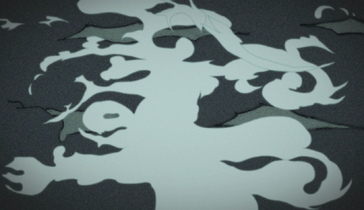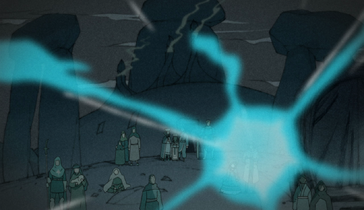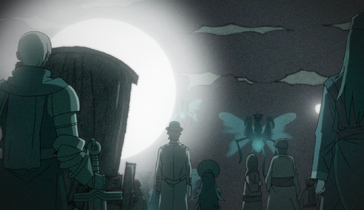| Book of the Sage | |
|---|---|
 | |
|
Original Name |
賢者の書 |
|
Romanized Name |
Kenja no Sho |
|
Author |
Unknown |
|
Debut |
|
|
Powers |
It summons spirits. |
|
User |
|
|
Status |
Inside the Dantalian's Bookshelf |
Book of the Sage, also known as Duban (ドウバーン Dōbān), is a Phantom Book used by Hugh to make the Broken Wings disappear. It’s present in the Book of Twilight story.
It’s an old book written in a foreign language.[1] In the anime, its cover has an illustration inspired by the One Thousand and One Nights, depicting a man in turban dragging camels towards a magnificent palace with bulbous domes.[2]
Background[]
The Middle Eastern Phantom Book is contained inside the Labyrinth Library.[1] Duban is a character in One Thousand and One Nights, a man of extraordinary talent, with deep understanding in many fields.[3]
In the anime, the title refers to Sulaiman or Solomon, a king and prophet of ancient Israel according to the Quran[4], the central religious text of Islam.[5]
Powers[]
The Book of the Sage has the record of a technique used to summon any of one thousand and one spirits. For instance, Hugh read the Phantom Book to defeat the Broken Wings by requesting aid from Kabikaj, destroyer of insects and guardian of books. Blades, fire and poison have no effect on the huge insects, but they thrashed around in agony when Hugh started to recite the words. Their outer shells cracked and crumpled into powder. The creatures vanished as if they've never existed.[1] In the anime, the Phantom Book shines blue when the user is reading it. A white mist raises to the sky and the targets disappear in a flash of light.[2]
Script[]
Hugh reads the Book of the Sage to summon a spirit.[2]
"I am sure that many of you are acquainted with my good master.
Twenty hours south of Damascus, past Daraa and up to Irbid,
Abdul shaved his head and took the name Alhazred.
Long ago, a wise man of Israel by the name Sulaiman visited our homeland.
Master of a thousand and one spirits, or jinn, who performed countless miracles.
Marid, Ifret, Shaitan.
There were many famous jinn.
However, there was one jinn who was most revered as a guardian spirit.
Kabikaj.
If it was to be summoned again, there will be an immediate effect.
Bean-eating, long-horned, caterpillars, silverfish, worms and lice.
They surround, surround and surround!
Plot[]

Aira's grandmother watches Hugh using the Book of the Sage.
The townsfolk went to the Chief Healer’s house to ask for her help. However, even the Yakatsu she prepares is useless against the enemies. The people are desperate, blaming each other. Hugh and Dalian examine Tito’s carriage. Tito's books wil attract the Broken Wings. Hugh tells everyone to leave that place, but it’s too late. The huge insects were approaching. The Labyrinth Library is opened and Hugh grabs the Book of the Sage. He reads the old book to summon a spirit which defeats the creatures. The big one, large as the outer wall of the town, squirmed in pain before disappearing. Their corpses were nowhere to be seen in the partially consumed forest. Hugh puts the Phantom Book back into the void on Dalian's chest.[1]
Trivia[]
- One Thousand and One Nights, also known as the Arabian Nights, is a collection of Middle Eastern and South Asian stories and folk tales compiled in Arabic during the Islamic Golden Age over many centuries.[6] In the anime, the work influenced the cover of the Phantom Book and part of its script, for instance when the number 1,001 is mentioned.[2]
- The Hezār Afsān and the Book of a Thousand Sorrows are other Phantom Books that refer to the One Thousand and One Nights.[7][8]
- Solomon is viewed as one of the elect of Allah. He was bestowed upon with many blessings, including the ability to rule jinn.[4]
- Jinn or genies are supernatural creatures in early Arabian and later Islamic mythology and theology. Marid, Ifrit and Shaitan are terms associated to evil spirits or jinns.[9]
- Kabikaj is a kind of jinn who, when invocated, saves books from worms and insects. The belief comes from the thought that a wild parsley of the same name has a scent which is said to drive insects away. The materials used in Arabic bookmaking attracted pests, so the plant or its name was used to protect the paper.[10]
- Abdul Alhazred, also called the Mad Arab, is a fictional character created by American horror writer H. P. Lovecraft and part of the Cthulhu Mythos. It's also a pseudonym adopted by the author after reading the One Thousand and One Nights in his early childhood.[11]
- Alhazred is the writer of the Necronomicon, a fictional grimoire with dangerous contents which describes how to summon the primordial beings known as the Old Ones. The book was originally called Al Azif, alluding to the nocturnal sound made by insects, supposed to be the howling of demons or jinn.[12]
- In the anime, when Hugh is reading the Phantom Book, Damascus is mentioned.[2] The capital of Syria is where Alhazred lived and authored the Necronomicon. The work contains secrets he learned at The Nameless City, a fictional ancient ruin located somewhere in the deserts of the Arabian Peninsula.[13][14] Perhaps that's why the Book of the Sage text also mentions someone heading south from Damascus and going through Daara and Irbid, cities located around the border between Syria and Jordan.[15][16]
- In the adaptation, a white mist comes out of the Phantom Book. Earlier, Hugh had used a fumigant in the form of a white mist.[2]
- A mock Book of the Sage is included in the special edition of Codex 5, the fifth volume of the Japanese DVDs and Blu-ray discs.[17]
References[]
|




